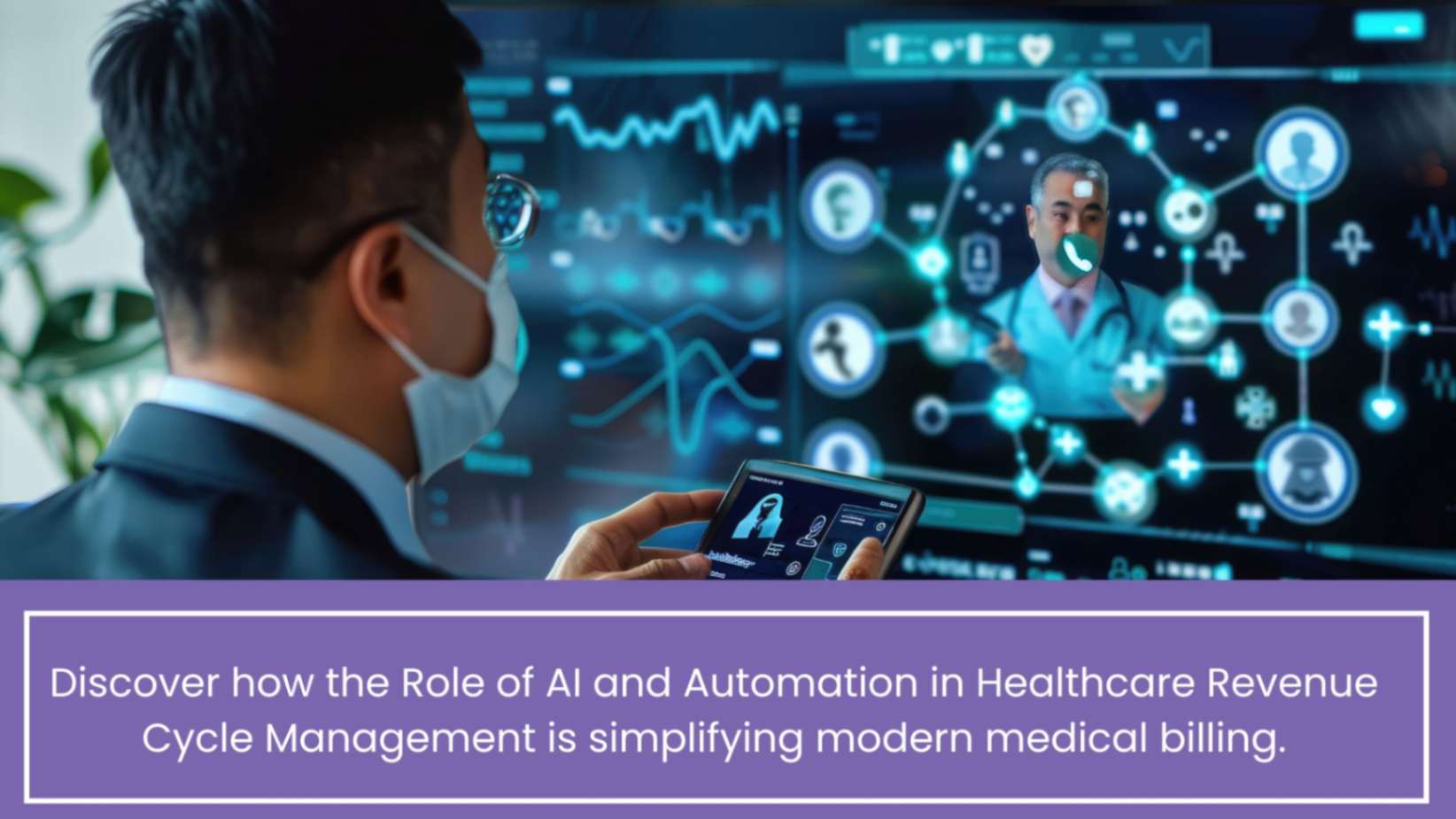Role of AI and Automation in Healthcare Revenue Cycle Management
At Practolytics, we’ve seen how the Role of AI and Automation in Healthcare Revenue Cycle Management completely changes the game for healthcare providers. From speeding up authorizations and claims to improving accuracy and cutting down errors, AI lets your revenue cycle run smoother and faster. We blend smart automation with our 20+ years of RCM expertise to help practices reduce AR days, prevent denials, and collect what they deserve — on time. Our goal? To give you back your time so you can focus on what matters most — your patients, while we take care of your financial operations behind the scenes.
Let’s be real — managing the financial side of healthcare can feel like juggling knives. Between patient billing, claim submissions, payer rules, and endless denials, most practices are buried in paperwork before lunch.
That’s exactly why the Role of AI and Automation in Healthcare RCM Services is such a big deal. It’s not about replacing people; it’s about helping them do their jobs better and faster.
At Practolytics, we’ve spent years perfecting the blend of AI in healthcare revenue cycle management automation with good old-fashioned human expertise. The result? A seamless, efficient process that takes the stress out of billing and brings predictability back into your cash flow.
Table of Contents
How AI is Rewiring the Financial Backbone of Healthcare?
Think of your RCM as the nervous system of your practice — if it’s slow or unorganized, everything suffers. That’s where AI steps in.
The Role of AI and Automation in Revenue Cycle Management Services means the software isn’t just processing data — it’s learning, predicting, and optimizing everything from claim submissions to denial trends.
Here’s what that looks like in action:
- Automation tools for hospital revenue cycle processes handle the boring stuff — data entry, eligibility checks, and claim scrubbing — with zero fatigue.
- Machine learning denial management in the healthcare revenue cycle keeps getting smarter over time, learning why claims fail and fixing issues before they snowball.
- Predictive analytics for claim denials in hospital billing tells us which claims are likely to be rejected, so we fix them before sending them out.
- And AI in healthcare revenue cycle management automation ensures your team spends less time clicking and more time actually managing.
We’ve seen practices cut their AR days almost in half within months of implementing AI-backed tools. That’s not theory — that’s real-world impact.
Why AI and Automation Are No Longer Optional?
The healthcare world moves fast. New payer rules, changing codes, rising patient expectations — and limited staff to handle it all.
If your RCM is still running on spreadsheets and manual updates, you’re not just behind — you’re losing revenue every single day.
Here’s why AI and automation are now essential:
- Scalability: As your practice grows, AI in healthcare revenue cycle management automation grows with you. No burnout. No hiring scramble.
- Accuracy: Natural language processing for medical coding and revenue cycle ensures every code is compliant and correctly documented.
- Speed: Healthcare charge capture automation best practices mean charges get recorded instantly — no more billing backlogs.
- Compliance: Automation double-checks everything, helping you stay audit-ready.
- Smarter Spend: AI cost in revenue cycle management pays for itself fast by reducing manual labor and denial rework.
The bottom line? Automation turns chaos into clarity. It keeps your revenue predictable, your workflow clean, and your stress levels low.
Real Benefits of AI and Automation in RCM
So what actually changes when you bring AI into your revenue cycle? Everything — and for the better.
At Practolytics, here’s what our clients experience:
- Faster claims: With AI through automated healthcare, we ensure clean claims go out within 24 hours.
- Better denial prevention: Machine learning denial management in the healthcare revenue cycle cuts rejection rates significantly.
- Lower AR days: With predictive analytics for claim denials in hospital billing, we keep your AR under 30 days.
- Happier patients: Thanks to patient billing optimization using AI in the revenue cycle management services, bills are accurate, clear, and easy to understand.
- Fewer errors: Automation handles routine tasks consistently — no fatigue, no missed steps.
It’s a win-win: your staff gets breathing room, your patients get better transparency, and your practice gets paid faster.
Key AI Technologies Powering This Shift
Let’s break down the tech that’s quietly running your RCM in the background:
1. Robotic Process Automation (RPA)
How robotic process automation (RPA) improves the medical billing cycle is simple — it handles repetitive tasks like data entry, claim submission, and payment posting faster than any human could. These bots work 24/7, never call in sick, and never miss a step.
2. Natural Language Processing (NLP)
With natural language processing for medical coding and revenue cycle, AI can understand and code clinical notes automatically. That means fewer errors and faster turnaround times for coding and billing.
3. Machine Learning (ML)
Machine learning denial management in the healthcare revenue cycle constantly learns from your historical data. It spots trends — like recurring payer issues — and helps prevent denials before they happen.
4. Predictive Analytics
Predictive analytics for claim denials in hospital billing gives practices a superpower: foresight. It helps identify high-risk claims so your team can fix them proactively.
5. Intelligent Dashboards
Our analytics tools provide visibility into everything — from reducing days in accounts receivable via AI in healthcare to denial rates and payer performance.
This is the kind of insight that turns reactive teams into proactive revenue leaders.
Future of AI in RCM
If you think AI’s current impact is impressive, wait till you see what’s coming next.
Here’s where the Role of AI and Automation in Healthcare Revenue Cycle Management is heading:
- Zero-touch billing: Imagine a system where claims are coded, scrubbed, and paid — without human touchpoints. That’s coming.
- Voice-driven documentation: Natural language processing for medical coding and revenue cycle will soon let you dictate notes and get instant, accurate coding.
- AI-powered audits: Smart tools will run compliance checks automatically, catching upcoding or undercoding before payers do.
- Transparent patient billing: Patient billing optimization using AI in the revenue cycle management will make out-of-pocket estimates clear upfront.
- Smarter forecasting: Predictive models will help you anticipate payer trends and adjust your strategy in advance.
At Practolytics, we’re not waiting for this future — we’re already building it.
How Practolytics Helps You Get There?
We’ve been in this space for over two decades, and if there’s one thing we’ve learned, it’s that healthcare providers need more than just software — they need a partner who understands their challenges.
That’s what makes Practolytics different.
We bring:
- End-to-end RCM services, from coding to claims to AR follow-ups.
- A team of expert RCM specialists covering 28+ medical specialties.
- 5 million+ claims processed every year, across 31 states.
- 100% HIPAA compliance and ISO-certified processes for data security.
- Free access to AdvancedMD EHR & PMS — because tech shouldn’t cost extra.
Our secret sauce? We pair automation with empathy. Technology does the heavy lifting, while our people make sure every client gets hands-on support and tailored solutions.
You handle patient care. We handle your peace of mind.
Conclusion:
The Role of AI and Automation in Healthcare Revenue Cycle Management isn’t just a passing trend — it’s the future of healthcare finance. At Practolytics, we’ve watched automation cut AR days, slash denials, and make life easier for medical staff everywhere. With AI in healthcare revenue cycle management automation, machine learning denial management, and predictive analytics for claim denials, we’re helping providers take control of their finances and focus on care again. The days of endless paperwork and payment delays are over. The future is faster, smarter, and fully automated — and we’re thrilled to help you be part of it.
How does AI in billing actually benefit my time with patients?
By automating claim submission, eligibility checks, and denials, AI in healthcare revenue cycle management automation frees up your team’s time — so you can spend more of yours with patients.
Do I need to change how I write notes for AI coding?
Nope! Natural language processing for medical coding and revenue cycle reads your existing documentation just fine. You write like you always do — AI takes care of the coding.
Will AI increase my risk of audits or upcoding?
Actually, the opposite. AI through automated healthcare ensures every claim is accurate and compliant, reducing the chances of audit-triggering errors.
Can prior authorization automation tools really save time?
Absolutely. Our automation tools for hospital revenue cycle processes handle prior authorizations end-to-end — with real-time tracking and zero extra effort from your staff.
Can AI help identify documentation gaps that lead to denials?
Yes! Machine learning denial management in the healthcare revenue cycle flags missing data or patterns that cause denials, letting you fix them before they cost you revenue.
ALSO READ – Essential Tips for Error-Free Orthopedic Billing and Coding: Boost Your Practice’s Financial Health
Talk to Medical Billing Expert Today — Get a Free Demo Now!





